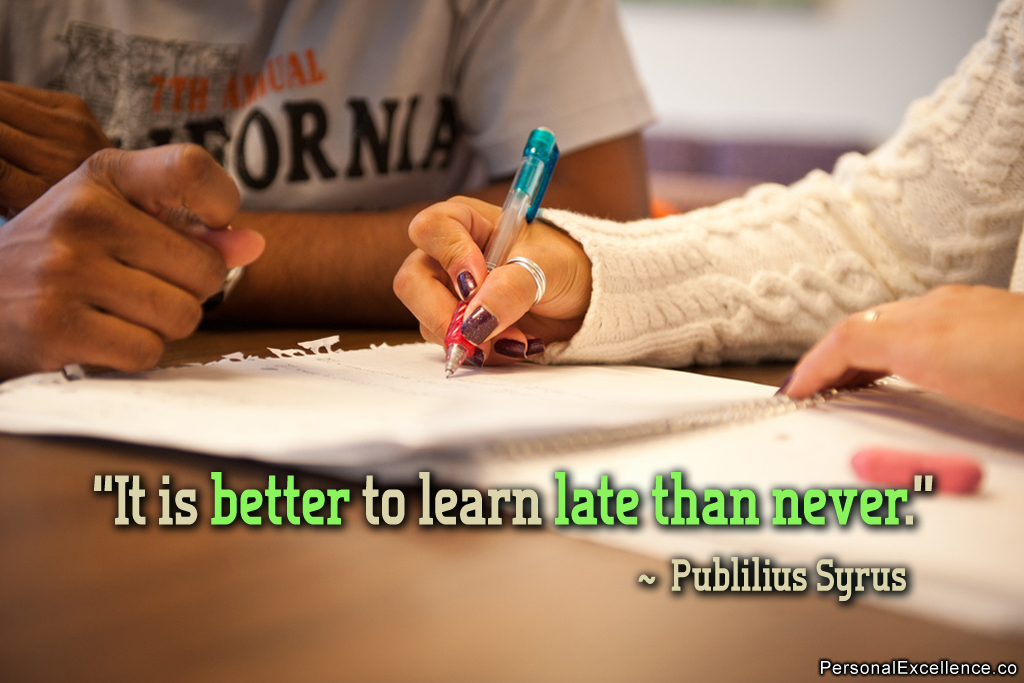
“Hi Celes, I often feel depressed and regretful about my lack of progress in life. Honestly I am angry and bitter about it. This creates a lot of anxiety for me and I think it’s a big source of my procrastination. What can I do about this?” — M
Dearest M, I’m really sorry to hear that you’re going through this. Let’s see if we can try to break this down together.
The first thing that comes to mind, without knowing more about your situation, is that your problem sounds like it’s self-created. By that, I’m not trying to disregard your problem. Suffering, whether it’s self-inflicted or not, is still suffering.
What I mean is that it doesn’t sound like there’s something physically threatening in your life that’s creating your anxiety/unhappiness. Rather, this anxiety seems to be coming from a mental feeling about a certain mismatch in your life.
This doesn’t mean that your problem is any lesser than other people’s problems, though one can say that a self-inflicted, mental unhappiness is, in a way, a “luxury” problem compared to someone who is homeless. It’s important to be aware that what has been driving your unhappiness, anger, or bitterness isn’t a pressing life-and-death issue (like physical danger), but something internal. The latter is the case for most of modern day problems, like misery from being single, depression from not fitting into a certain beauty mold, unhappiness from not having a certain level of wealth, etc., and it’s important to be aware of this as we dive into the issue.
That said, let’s take a deeper look into your problem. Because I can only reply based on your question and there isn’t much to go on, I can only make some assumptions here.
What is “Progress”?
M, you say that you feel depressed and regretful about your lack of progress. What exactly do you mean by “lack of progress”?
- Do you mean that you’re not at a certain place in life yet?
- Or that you have not reached a certain target for your goals?
- Or that you are simply not making any progress in life at all, as you haven’t been taking any action on your goals?
Because each of these situations is very different, getting clarity on what exactly you mean by “lack of progress” can provide more insight into your problem, which can then allow you to act appropriately.
If we look up the word “progress,” it means “forward movement towards a destination.” My guess, M, is that you have a specific definition of “progress” in your life and you have likely developed a mental target of what you want accomplished by a certain date, age. Perhaps this target is to set up a successful business. Perhaps it’s to earn $XXX. Perhaps it’s to be in a certain job with a nice pay check. Or maybe it’s to be happily married with kids, or to be living in an apartment of a certain size, or to have traveled XYZ countries. Maybe it’s several of these goals combined.
My guess is that when these targets were not achieved in your target time frame, you then felt like there was a lack of progress. This then led to feelings of regret, anxiety, or even anger and bitterness.
Our Goals
In my How To Achieve 10/10 Self-Esteem webinar, I talk about how many people — all of us on earth really — tend to feel unconfident because they have not accomplished their goals. Goals like losing weight, finding their soulmate, earning a certain level of income: basically similar to the targets that I mentioned above.
So they spend their whole life trying to achieve these goals, so as to be confident and happy. Those who are single fork out chunks of money to join dating agencies so that they can perhaps find love; people who have not reached their ideal weight spend thousands of dollars on weight loss programs; those who have yet to earn $X amount of money work extra hard to earn that income, or even spend thousands of dollars on ridiculous internet/wealth courses that promise to give them the ticket to riches/freedom. And so on.
These are not overnight goals for sure. So for many, it takes them half their life to achieve these goals. Some may fail in doing so. Others succeed after much hard work.
For those who succeed, they naturally become ecstatic. To achieve Xkg, to be in a good relationship, to earn a high level of income, to become highly recognized at work, etc. — doing so makes them feel like they have reached a new place in life. They celebrate these milestones with pride and soon, they’re onto their next goal.
Now, for the goals that are irreversible, like achieving an award, they stick with you for life. By “irreversible,” I mean the achievement of these goals can never be taken away. So for example, when you win a gold medal at a race, you are permanently the gold medalist of that race, for that year. When you graduate as the top student in your school, you’ll always be the top student for that cohort. That is, unless you pull a Lance Armstrong and have your achievements retracted, which is a totally separate thing altogether. Such goals are great of course, because nothing can ever change the fact that you have achieved them.
But then there are the goals that are reversible. For example, someone working in a great job can always be retrenched. Someone who is having a great pay can always get a pay cut. A thriving business can suddenly go bust due to changing market forces, as has happened to many companies, big or small. The kings of the early internet age, Yahoo, MySpace, and Napster, are no more than shadows of their former selves today, while former smartphone powerhouses BlackBerry and Nokia have been totally killed by Apple and Samsung.[1] Body weight that is lost can always be regained — those of you who have experienced yo-yo weight loss before will know. A great relationship can always end due to irreconcilable differences. Someone with incredible wealth can lose all of it overnight when the market turns. A thriving career can just be obliterated overnight, as Edison Chen, a once high-flying actor/singer/musician in Hong Kong / Asia, found out for himself after his sex photo scandal in 2008.
So what happens when these things happen? Some sink into depression as they try to reconcile what had just happened. Some are not able to accept the loss as they enter into a period of stasis. Some become angry, bitter, and start hating the world. In serious cases, some take their life, as was the case with Adolf Merckle, a German billionaire who took his life when he lost hundreds of millions of dollars in the economic crisis in 2009[2], as well as the people who allegedly committed suicide after their names were found in the 2015 Ashley Madison data leak.[3] (Ashley Madison is a site for adultery/affairs, so by virtue of having their names found in the leak, it can be implied that these people, if they are/were attached/married, were cheating or trying to cheat.)
And then there are those who are deeply unhappy despite living the dream life, or at least, the life that many in this world can only dream of. Amy Winehouse was a successful English singer who died of alcohol poisoning in 2011; prior to her death, she had achieved international success with her music, was the first British woman to win five Grammys, and had one of the best-selling albums in UK history. Winehouse acknowledged that she suffered from manic depression, had an eating disorder, and engaged in self-injury.[4] Supermodels, with the body that many girls could only dream of and the attention and adoration of men all around the world, are known to be depressed with heavy insecurities, at times having substance abuse problems.[5][6][7][8] There are many girls who aggressively lose weight only to still be insecure about their bodies after they hit their dream weight, something which I myself experienced before.[9]
And did you know? Japan, South Korea, and Iceland, which are some of the wealthiest nations in the world, have some of the highest suicide rates in the world.[10] In China, suicide was the cause of 23.6% of deaths among the extremely wealthy between 2008 and 2010.[11] Says An Lan, a physiological counselor and the founder of a counseling organization,
“The lives of millionaires and billionaires are probably harder than those of the poor, who can still hope and work for better lives. Wealthy entrepreneurs, in contrast, are confused about why they wanted to make money in the first place.”[12]
Obviously this is just a figurative comparison, because I don’t think anyone would reasonably think that millionaires and billionaires truly live harder lives than the poor. At the very least, the rich doesn’t have to worry about basic survival issues.
But I think his point is that despite one’s wealth, accomplishments, and/or good looks, one can still be depressed and empty on the inside. You can be filthy rich and this will help ease living a bit, because you don’t have to worry about resource limitations due to a lack of money. However, it will never cover up a deep-set unhappiness that is in one’s soul.
Getting to the Root
This is not to say that all people who have accomplished great goals are unhappy. Neither is it to say that we shouldn’t work on our goals or work toward big goals because they won’t make us happy. The process of pursuing our goals helps us learn, grow, and become better humans. This pursuit helps us create a better existence, both for ourselves and for other people. There is a huge merit in setting goals and pursuing them, and to write off goal achievement based on the above would be to miss the whole point altogether.
What I’m trying to say here, M, is that I don’t think your “lack of progress” is the root source of your issue. I suspect the real issue is something else, something that has nothing to do with a “lack of progress.” What this “something else” is, is something you need to find out. I can, however, share some clues:
- Are you expecting the accomplishment of your goals to give you something? What is that? Let’s call this Y.
- Why is it that you can’t achieve Y now? Why is Y contingent upon the accomplishment of your goal(s)?
- Do you recognize that the reason why you can’t achieve Y now isn’t because you haven’t accomplished your goal(s)? Rather, it’s because you aren’t allowing yourself to do so, for some reason or another?
Y can be happiness. Y can be confidence in yourself. Y can be self-respect. Y can be self-love. Y can be freedom.
Whatever it is, the reason why you don’t have Y yet, the reason why you have been feeling unhappiness, anger, bitterness, regret, etc., especially when you’ve been having these emotions for a while, isn’t because you haven’t achieved enough. The reason stems from within. Maybe you were once taught that being more successful would earn you the respect of others. Maybe you believe that being skinnier or more attractive would get you love. Or that being more wealthy would give you confidence and love. Or that once you are accomplished, others would like you, love you.
But it doesn’t. Maybe it does, in that when you have M, people may fawn over you. But these are conditional friends and rewards. Why would one bother with having conditional friends, or seek for a positive emotion that is contingent upon the momentary accomplishment of a goal? Your happiness should come from the doing of a goal, vs. something that only comes when you have accomplished something. At the end of the day, achieving your goals will change your life, sure. But they will not change your underlying dissatisfaction or unhappiness with yourself and life, especially if it were never there to begin with.
My Experience
For me, after I lost all my excess weight in my 21-day fast back in 2011, I was ecstatic because I had finally got rid of the weight that I had been wanting to lose for years. This is it! I thought. I’m now thin and beautiful. I can now celebrate my body and be seen as attractive to guys! This was back when I was still single and looking for love.
But I was wrong, because I was still oddly insecure about myself and my weight. While my previous battle was in losing weight, my new battle switched to not overeating so that I wouldn’t regain the weight. I was constantly fearful of regaining the weight, in that I was worried of becoming ugly/unattractive should I even gain an extra kilo, or half a kilo. I wound up overeating due to my own stress issues, and regained all that lost weight back and more, over the period of a year. I felt so ashamed and miserable. It was after I addressed my internal issues that I subsequently lost all that weight again, this time permanently, without a fast, without some massive diet or exercise regimen. (I share my framework to stop emotional eating in my How to Stop Stress Eating Program.)
After I reached my highest ever income in my business last year (2015), I was very fulfilled by the lives that I had changed. I was getting many success stories and case studies, including from the people whom I had worked with prior to 2015, and I was happy to even make a small impact on their lives.
But I was miserable on the inside. I was miserable because I became stretched very thin by all the things that I was doing, as well as all the people I was serving/helping, often times going way out of my obligation/duty to address their individual issues, causing my own self-deprivation. Such issues could sometimes include an insensitivity or inconsideration to others’ goodwill/generosity, so it could be cases where I was offering X not out of my job commitment but out of goodwill, and some could try to take 10X without consideration of my own space/needs.
After I started protecting my own space and needs, I became much happier. I began to plan from the perspective of my needs/wants, and designed my agenda around that. I also started to pursue things like say, The Personal Excellence Podcast, which don’t bring me any revenue but help me forward my mission.
Just to be clear, it’s not earning more money that’s the issue here. One can earn more money and still have free time, with good time management and delegation. This is especially so if you are a business owner. Neither is it an issue of “money is evil” or that “we shouldn’t earn more money,” which I find a self-limiting belief in nature.
What this experience validated to me was that just because someone has more income, doesn’t mean that the person is naturally happier. Once you are lucky enough to have enough money to take care of your basic needs and maybe pursue some personal goals (and by that I don’t mean materialistic goals; these fill a bottomless pit), money doesn’t significantly change the emotional narrative of your life. The extent to which money does change your life then becomes tied to the story that you tell yourself. Which comes to the question that I asked above:
What do you expect to get from the accomplishment of your desired goal(s)?
Is it…
Respect?
Attention from other people?
Fame?
Glory?
A feeling of self-worth?
Self-confidence?
Happiness?
Freedom?
Or even love?
Whatever you are looking for, if you don’t feel it in you right now (barring real physical limitations due to your environment/life), you ain’t gonna get it even when you accomplish your goal. You may feel good for a moment, sure. But when the dust settles, as the adrenaline of reaching the goal disappears, you will be left with the same struggles, issues. And how happy you are, how self-motivated you are at this point in time, will depend on who you are on the inside and your self-beliefs.
So, here are some pointers for you:
- If you’re trying to look for respect, you don’t need respect from other people. You just need to first respect yourself. When you respect yourself, others’ respect wouldn’t matter, not as much.
- If you’re looking for confidence, confidence starts from within you, how you see yourself. Read: How To Be The Most Confident Person In The World and 7 Tips To Overcome Impostor Syndrome
- If you’re looking for happiness, realize that happiness starts from your ability to appreciate what you have, the ability to see the glass as being half full — or “full” full as I like to say it (half full with air, half full with water :) ). Read: 10 Timeless Principles To Be Happy and How to Stop Comparing Yourself With Others
- If you’re looking for love, love comes from first loving yourself. When you seek love out of self-hate or lack of love, you need to ask yourself the kind of broken souls you’ll be attracting to fill your “gaps” and “voids”. Is that what you want? Read: How Can I Stop Feeling Lonely? and Are You Looking For A Relationship To Complete Yourself?
- If you’re looking for popularity/attention, realize that popularity comes from first being someone you are proud of, someone you aspire to be… starting from your values and day-to-day behavior. When you radiate active energy, zest, and drive, you naturally become charming. Read: How To Be Charming in Under 500 Words
- If you’re starting from a place of zero, and you have no idea how to start, read: How To Start When You Have Nothing and How Do I Prepare For My Comeback in Life?
Working on the above may seem like an absolute waste of time. But it’s not. In fact, it’s by working on these highly crucial internal tasks now that you break out of the vicious loop of negativity and unhappiness. In fact, I dare say that some of the feelings you’ve been feeling are likely due to the neglect of the above in the past 5, 10, 15 years, leading to this struggle today.
On the other hand, when you try the usual, make-believe path of working on an external goal purely to feel happy/confident, you are actually going down a rabbit trail. You will gain some skills here and there, and this is important. But in the end, you will find yourself right back where you were, in terms of your personal happiness.
Oddly enough, as you do these seemingly unconstructive tasks, you will find yourself getting the desire to act. As you start working on your inner world, you begin to naturally take action. Without forcing yourself, without repressing yourself, without angst and unhappiness.
I wish you all the best in your journey, X. And let me know how everything goes. :)
- Check out my related podcast: How To Deal With Depression When It Comes to Our Goals
- Read: Are You Facing Repeating Patterns in Life?
(Image: Depressed man sitting in the tunnel)






![Science of Happiness [Infographic]](https://personalexcellence.co/files/infographic-science-of-happiness-200x1200.jpg)


 Thanks for reading. If you like my free articles, join my private email list and get my latest updates and articles sent right to your inbox.
Thanks for reading. If you like my free articles, join my private email list and get my latest updates and articles sent right to your inbox.